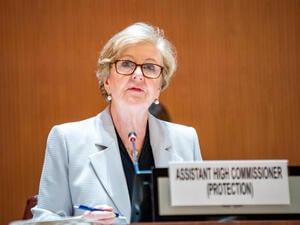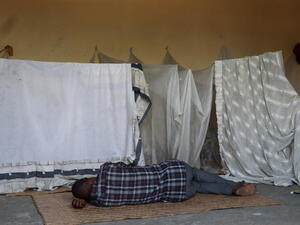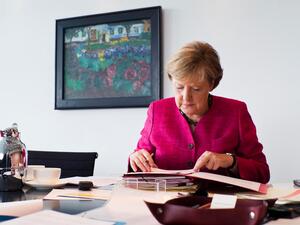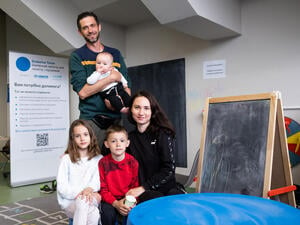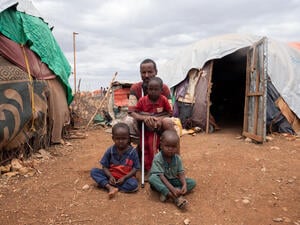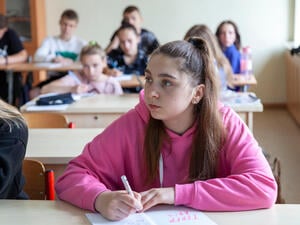Statement on risks of trafficking and exploitation facing refugees from Ukraine attributed to UNHCR's Assistant High Commissioner for Protection
Statement on risks of trafficking and exploitation facing refugees from Ukraine attributed to UNHCR's Assistant High Commissioner for Protection
The Ukrainian refugee crisis is a protection crisis for women and children - they account for 90 per cent of all those fleeing from Ukraine across the borders.
We know that the risks of gender-based violence, trafficking, abuse, psychological trauma and family separation increase in times of conflict and displacement, but given the gender profile of this refugee outflow, and the fact that many children have fled alone, these are now multiplied.
As is the case in emergencies and owing to the hidden nature of human trafficking, data is difficult to ascertain, and it is impossible to gauge how many Ukrainian refugee women and children might have been preyed upon by traffickers. So far, known cases are thankfully few.
But we are on high alert and warning refugees on the risks of predators and criminal networks who may attempt to exploit their vulnerability or lure them with promises of free transport, accommodation, employment or other forms of assistance.
Human trafficking, a crime in which a person is tricked, trapped or coerced into a situation of exploitation for another person’s private gain or profit, can take various forms, such as sexual exploitation or other forms of gender-based violence, forced labour, domestic servitude or other slavery-like practises, forced begging or criminality.
National authorities are actively leading the response to counter human trafficking, but more needs to be done to tackle this problem and mitigate risks. Humanitarians, including UNHCR, the UN Refugee Agency, and others are scaling up their capacity to support national efforts, in collaboration with partners.
All neighbouring and impacted countries must ensure the immediate identification, registration, protection and appropriate care of children traveling on their own or separated from their parents and families. States should find solutions in the best interests of these children and scale up national child protection systems to respond to their needs.
Vetting systems must also be strengthened to register and screen organisations, companies and individual volunteers offering support to refugees. This includes buses and minivans that are transporting refugees for free from border points and onwards to other European countries. Refugees need to be able to travel safely without being worried about criminal networks taking advantage of their desperate situation. While the generosity and solidarity towards Ukrainian refugees has been inspiring, states must prevent predatory individuals and criminal networks from exploiting the situation.
We urge border control and law enforcement officials, as well as social services, in the region and beyond, to strengthen anti-trafficking efforts, from early detection and prevention of criminal activity, to outreach and support for those who are abused or exploited, and ensuring perpetrators are swiftly brought to justice, and victims compensated for harm suffered.
UNHCR is working closely with host governments which are in charge of refugee registration and is supporting the identification of refugees at risk, assessing human trafficking risks through protection monitoring, deploying specialist staff and training volunteers on protection against exploitation and abuse, trafficking and gender-based violence. Early on, UNHCR also launched a “Stay Safe” awareness raising campaign to inform Ukrainian refugees of risks and offer tips on how to keep safe.
With national authorities and partners, including UNICEF, we are also rolling out one-stop safe spaces for children and families as well as other individuals who require specialised assistance across the countries neighbouring Ukraine. Known as “Blue Dots”, these are hubs for protection service, information and referrals. They also offer accurate and up-to-date information to refugees, so that they can make informed choices about onward movement and travel options and guide them to services.
Within Ukraine, UNHCR and other humanitarian partners work to ensure the dissemination of awareness-raising messages to the public, in particular at border points and in locations where people have been displaced. These messages also include information on access to free anti-trafficking hotlines.
A concerted effort by national authorities, law enforcement agencies, NGOs, humanitarian workers and refugees themselves, is needed to prevent abuse and violations of the rights of all those refugees fleeing the war in Ukraine.
For more information on this topic, please contact:
- In Geneva, Shabia Mantoo, [email protected]; +41 (79) 337 76 50

